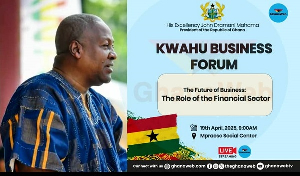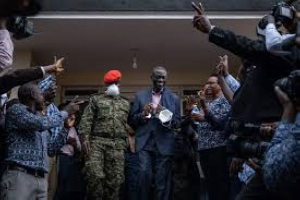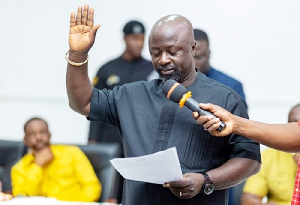Accra, July 24, GNA - The National Reform Party (NRP) announced on Thursday that it has withdrawn from the Nkrumaist unity talks saying its task now is to review and integrate the many lessons learned from the talks into its own "systematic forward movement."
A statement signed by Mr Kyeretwie Opoku, General Secretary, said the party's withdrawal from the talks took effect from July 12, 2003. "Our decision follows the CPP's rejection of the merger proposals prepared by the Inter-Party Coordinating Committee (IPCC) of the CPP, GCPP, NRP and PNC and approved by the NRP congress in March 2003," the statement said.
The NRP traced the history of the merger talks, which came out with "specific merger proposals through the IPCC, and said subsequent developments in the Convention People's Party (CPP) showed that its National Executive Committee (NEC) rejected the IPCC proposals". The statement said the CPP wrote to the NRP giving it a one-month ultimatum ending on August 5 to "unconditionally adopt the CPP and its identity".
The NRP said on July 21, the CPP opened nominations for national elections, adding that CPP's letter indicated that if the NRP took the requisite legal steps to dissolve itself in two weeks, it could contest the national positions at the CPP congress in September.
"The NRP will not climb into a vehicle with other parties until we have agreed where that vehicle is going, by what route we hope to reach this destination and how we will select and control the driver and 'aplanke'."
It said the IPCC's proposals provided such a plan.
"The 'New Convention' or political platform for the merger identifies a national and international system of economic, social and political inequality as the root causes of our people's suffering. "It identifies mass activism in pursuit of socio-economic justice by the disadvantaged themselves as the most important requirement for transforming our society to a more just, productive, wealthy and internationally influential one."
The NRP said the draft constitution ensures that relations between party members would be democratic and that the caprice, greed or vanity of a few "big men" will not dominate the party.
The NRP said a new CPP could attract a younger generation of activists and voters in a way the present CPP, associated with comrades in their 60s and 70s, could never hope to do.
It said the NRP had proposed the "New CPP" in tribute to the original CPP and although the People's National Convention (PNC) initially opposed this, it eventually proposed a compromise involving the use of its symbol.
"A reasonable compromise would have enabled or even compelled PNC participation in a merger thereby unifying and strengthening Nkrumaist identity."
The NRP said the quest for progressive unity requires a new strategy and new partners and it would continue to develop an open platform for activism.
It said the party's National Council would meet in October to initiate branch, constituency and regional meetings towards a national congress in February next year.
"These meetings will clarify our approach to the 2004 elections and beyond and select new national officers to manage our march into a very bright but challenging future."
General News of Thursday, 24 July 2003
Source: GNA


![Thomas Partey [L] in a hug with Coach, Mikel Aterta Thomas Partey [L] in a hug with Coach, Mikel Aterta](https://cdn.ghanaweb.com/imagelib/pics/715/71574503.295.jpg)









